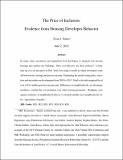The Price of Inclusion: Evidence from Housing Developer Behavior
Author(s)
Soltas, Evan J.
DownloadNYC421a_MITArchive.pdf (5.398Mb)
Publisher Policy
Publisher Policy
Article is made available in accordance with the publisher's policy and may be subject to US copyright law. Please refer to the publisher's site for terms of use.
Additional downloads
Publisher Policy
Publisher Policy
Article is made available in accordance with the publisher's policy and may be subject to US copyright law. Please refer to the publisher's site for terms of use.
Terms of use
Metadata
Show full item recordAbstract
In many cities, incentives and regulations lead developers to integrate low-income housing into market-rate buildings. How cost-effective are these policies? I study take-up of a tax incentive in New York City using a model in which developers trade off between tax savings and pre-tax income. Estimating the model using policy variation and microdata on development from 2003 to 2015, I find a citywide marginal fiscal cost of $1.6 million per low-income unit. Differences in neighborhoods, not developer incidence, explain the cost premium over other housing programs. Weighing costs against estimates of neighborhood effects, I conclude middle-class neighborhoods offer “opportunity bargains.”
Date issued
2022-07-26Department
Massachusetts Institute of Technology. Department of EconomicsJournal
Review of Economics and Statistics
Citation
2022. "The Price of Inclusion: Evidence from Housing Developer Behavior." Review of Economics and Statistics.
Version: Final published version